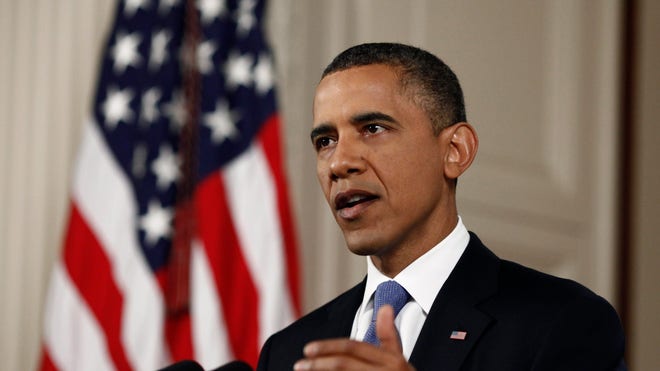Don't be fooled, Americans are starting to embrace ObamaCare
Watching President Obama's response to Thursday's Supreme Court
decision upholding the constitutionality of his health care reform law, I
could not help but think how different things would be if he had given
the same speech two years ago.
He began his remarks from the White House by saying the Court had “reaffirmed a fundamental principle that here in America -- in the wealthiest nation on Earth -- no illness or accident should lead to any family's financial ruin.”
Reaffirmed?
If you ask most Americans, they will tell you the president and his party never made that point in the first place. All the talk was about “Cornhusker Kickbacks” and “Chicago-style politics,” to win votes in Congress. GOP critics hammered the plan as a “big government takeover” and “socialism.”
But with last week’s Supreme Court ruling in favor of the health care plan public opinion on the plan is starting to become more favorable.
On Sunday Reuters released a poll showing 48 percent of registered voters now back the bill. That is up five percent since the ruling. That includes a bump in support among independent voters from 27 percent to 38 percent. And even opposition among Republicans, who overwhelmingly hate it, went down five percentage points from 86 percent to 81 percent.
And those numbers are likely to keep rising. Also, GOP critics are now on the defensive. They have to talk about specific benefits in the law and how they could do better if they repeal the law.
That is going to be hard for Republicans once Americans personally start reaping the benefit of the law.
Here are a couple of reasons why I say this:
First, the parts of the president's health care law that have already been implemented are actually very popular. And Americans tell pollsters they don't want to see them taken away.
Clear majorities of people say they want insurance companies to cover those with pre-existing conditions, they want children to be able to stay on their parent's health insurance until they are 26 or find a job, they don't want insurance companies dropping people's coverage when they get sick or hiking up their premiums. If you poll senior citizens and ask them if they like saving money on their prescription drugs, they say they do.
Second, while it is not a majority there is still a significant percentage of Americans people who say they oppose the law because they think it doesn't go far enough. They wanted a public option or single payer.
For example, a New York Times/CBS News poll released in early June found that 37 percent of Americans believed the law went too far, while 27 percent said not far enough and 25 percent said about right.
When you delve deeper into the numbers 26 percent of those in opposition thought the law was about right or wanted the government to go even further – they wanted a Medicare type program to cover all Americans regardless of age.
One of the main reasons for opposition to the bill was the mandate for everyone to have health insurance or pay a tax/penalty equal to cost of an insurance premium.
Mitt Romney understood the necessity of the individual mandate when he was governor of Massachusetts. That is why he made it the centerpiece of RomneyCare.
Though he disowned it during the 2012 GOP primaries, RomneyCare has been a monumental success. The Bay State currently has the best insurance coverage rate of any state in the union – with 100 percent of all children in the state covered and 98 percent of all residents.
The Obama campaign would be wise to point this out as they message their health care victory between now and November.
The Court’s decision also means that the other good provisions of the Affordable Care Act will be allowed to stand.
As the president pointed out in his speech, 13 million Americans or their employers who provide health insurance will be receiving a rebate check from their insurance companies this summer. The new law requires insurers to spend 80 percent of their money on insurance and not on administrative overhead and bonuses to their CEOs.
Seniors citizens will also receive a discount on their prescription drugs, which the president noted has already saved more than 5 million Medicare beneficiaries about $600 each. By 2020, the law will fully close the Medicare part D coverage gap – commonly known as "the donut hole" – saving seniors even more money.
Americans enrolled in Medicare Part C – or Medicare Advantage -- have seen their premiums lowered by 16 percent since 2010, giving seniors access to inexpensive, quality health care. Their premiums will continue to be lowered once the law is fully implemented.
People concerned about fraud in Medicare should also applaud the Court’s decision. Due to new enforcement powers given to the Departments of Justice and Health and Human Services, $4.1 billion in fraudulent Medicare claims were stopped in 2011. This constitutes the largest sum ever recovered in a single year from individuals and companies attempting to defraud the American taxpayers. Look for a continued reduction in the incidence of Medicare fraud in the coming years.
Now that the president has demonstrated that he is willing to explain the benefits of the law to the American people, those numbers are pliable – they can be moved between now and the election.
Chief Justice John Roberts has not only given ObamaCare the imprimatur of constitutionality, he has given the president license to brag about his bill on the campaign trail.
Juan Williams is a Fox News political analyst. He is the author of several books including "Enough: The Phony Leaders, Dead-End Movements, and Culture of Failure That Are Undermining Black America--and What We Can Do About It " and "Muzzled: The Assault on Honest Debate
" and "Muzzled: The Assault on Honest Debate .
.
He began his remarks from the White House by saying the Court had “reaffirmed a fundamental principle that here in America -- in the wealthiest nation on Earth -- no illness or accident should lead to any family's financial ruin.”
Reaffirmed?
If you ask most Americans, they will tell you the president and his party never made that point in the first place. All the talk was about “Cornhusker Kickbacks” and “Chicago-style politics,” to win votes in Congress. GOP critics hammered the plan as a “big government takeover” and “socialism.”
But with last week’s Supreme Court ruling in favor of the health care plan public opinion on the plan is starting to become more favorable.
On Sunday Reuters released a poll showing 48 percent of registered voters now back the bill. That is up five percent since the ruling. That includes a bump in support among independent voters from 27 percent to 38 percent. And even opposition among Republicans, who overwhelmingly hate it, went down five percentage points from 86 percent to 81 percent.
And those numbers are likely to keep rising. Also, GOP critics are now on the defensive. They have to talk about specific benefits in the law and how they could do better if they repeal the law.
That is going to be hard for Republicans once Americans personally start reaping the benefit of the law.
Here are a couple of reasons why I say this:
First, the parts of the president's health care law that have already been implemented are actually very popular. And Americans tell pollsters they don't want to see them taken away.
Clear majorities of people say they want insurance companies to cover those with pre-existing conditions, they want children to be able to stay on their parent's health insurance until they are 26 or find a job, they don't want insurance companies dropping people's coverage when they get sick or hiking up their premiums. If you poll senior citizens and ask them if they like saving money on their prescription drugs, they say they do.
Second, while it is not a majority there is still a significant percentage of Americans people who say they oppose the law because they think it doesn't go far enough. They wanted a public option or single payer.
For example, a New York Times/CBS News poll released in early June found that 37 percent of Americans believed the law went too far, while 27 percent said not far enough and 25 percent said about right.
When you delve deeper into the numbers 26 percent of those in opposition thought the law was about right or wanted the government to go even further – they wanted a Medicare type program to cover all Americans regardless of age.
One of the main reasons for opposition to the bill was the mandate for everyone to have health insurance or pay a tax/penalty equal to cost of an insurance premium.
Mitt Romney understood the necessity of the individual mandate when he was governor of Massachusetts. That is why he made it the centerpiece of RomneyCare.
Though he disowned it during the 2012 GOP primaries, RomneyCare has been a monumental success. The Bay State currently has the best insurance coverage rate of any state in the union – with 100 percent of all children in the state covered and 98 percent of all residents.
The Obama campaign would be wise to point this out as they message their health care victory between now and November.
The Court’s decision also means that the other good provisions of the Affordable Care Act will be allowed to stand.
As the president pointed out in his speech, 13 million Americans or their employers who provide health insurance will be receiving a rebate check from their insurance companies this summer. The new law requires insurers to spend 80 percent of their money on insurance and not on administrative overhead and bonuses to their CEOs.
Seniors citizens will also receive a discount on their prescription drugs, which the president noted has already saved more than 5 million Medicare beneficiaries about $600 each. By 2020, the law will fully close the Medicare part D coverage gap – commonly known as "the donut hole" – saving seniors even more money.
Americans enrolled in Medicare Part C – or Medicare Advantage -- have seen their premiums lowered by 16 percent since 2010, giving seniors access to inexpensive, quality health care. Their premiums will continue to be lowered once the law is fully implemented.
People concerned about fraud in Medicare should also applaud the Court’s decision. Due to new enforcement powers given to the Departments of Justice and Health and Human Services, $4.1 billion in fraudulent Medicare claims were stopped in 2011. This constitutes the largest sum ever recovered in a single year from individuals and companies attempting to defraud the American taxpayers. Look for a continued reduction in the incidence of Medicare fraud in the coming years.
Now that the president has demonstrated that he is willing to explain the benefits of the law to the American people, those numbers are pliable – they can be moved between now and the election.
Chief Justice John Roberts has not only given ObamaCare the imprimatur of constitutionality, he has given the president license to brag about his bill on the campaign trail.
Juan Williams is a Fox News political analyst. He is the author of several books including "Enough: The Phony Leaders, Dead-End Movements, and Culture of Failure That Are Undermining Black America--and What We Can Do About It
 " and "Muzzled: The Assault on Honest Debate
" and "Muzzled: The Assault on Honest Debate .
.

Incredible points. Solid arguments. Keep up the amazing effort.
ReplyDeleteReview my blog pot vaporizers